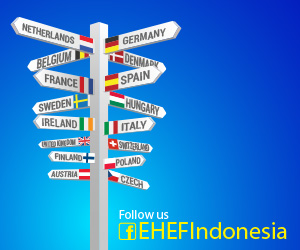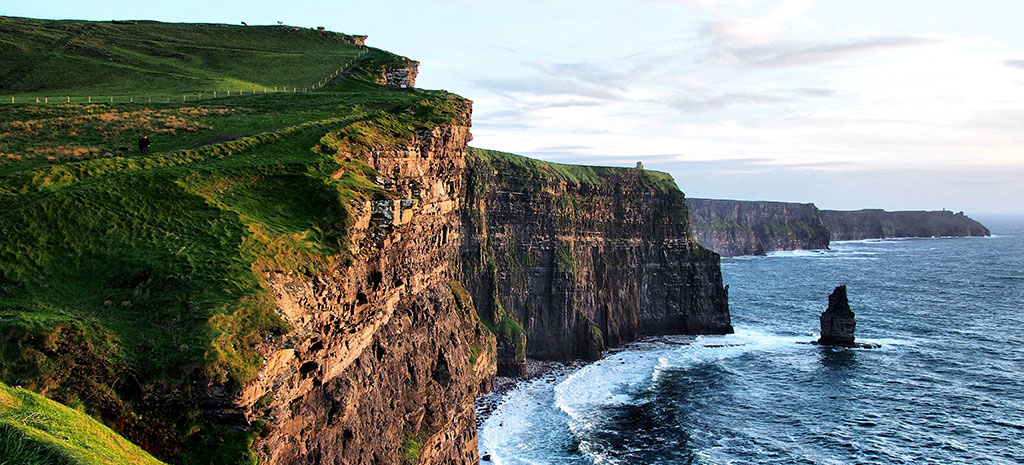
Study in Ireland
Last edited on 04 Mar 2026
Welcome to Ireland!
For a small country, Ireland has made a big impact. We’ve given the world saints and scholars, artists and entrepreneurs, scientists and sporting heroes. We’ve built a reputation for innovation, hard work and determination but we’ve still kept our inimitable outlook on life. Ireland is the last stop between Europe and the US. It is renowned for its beautiful, unspoilt countryside. It’s unique location makes Ireland home to the world, some of the world’s leading multinational companies are based in Dublin– such as Linked in, Google, Facebook, Twitter, Apple, Intel, Genzyme and EA games. In fact, it has become the European hub for more than 1,000 leading multinational companies.
Choose your future
Ireland’s Higher Education Institutions have over 5,000 courses on offer across the spectrum of medicine, science, technology, engineering, business, law, languages, literature, history, philosophy, psychology, sociology and other humanities as well as the creative, visual and performing arts.
Ireland’s 34 higher education institutions offer a remarkable 5000+ programs, covering a huge and diverse range, these courses lead to internationally recognized, and quality assured qualifications. So whether you want a strong, focused business school, a center of scientific and technology excellence, or a world-renowned English language, humanities, and arts faculty you will find it in Ireland.
Ireland is known for a country which is safe, and friendly with multicultural people, and English as a preferred language for communication, having the global reputation and interesting course options can build a potential students career prospect.
Courses can often include work placement and intern opportunities so studying here can also kick start a successful career. English fluency and friendly environment makes it the ideal spot for top International companies looking for a European base. Nine of the top 10 global software companies, all top 10 born on the internet companies, 9 of the top 10 US ICT companies and 4 of the top 5 IT services companies are in Ireland.
If you’re interested in a career in ICT, why aren’t you in Ireland? Ireland is also home to an extensive and well established pharmaceutical industry. Around, 120 overseas companies have plants in Ireland including 9 of the 10 largest pharmaceutical companies in the world. The friendliness and hospitality for which Irish people are renowned, contribute to the ease with which overseas students adapt to the way of life and in particular, student life. Ireland also has a one year stay back programme for graduates. This can give you the opportunity to gain work experience with the top multinational companies.
Universities in Ireland
Student Cities in Ireland
Dublin
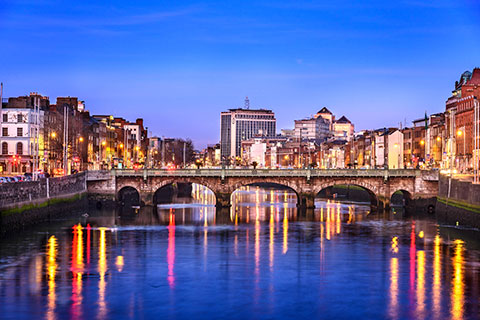
The Irish capital has by far the greatest concentration of Irish universities and colleges – among the reasons for its place in the QS Best Student Cities index. A popular city-break destination, there’s certainly no shortage of things to see and do in Dublin – from admiring beautiful medieval architecture and retracing the steps of famous novelists, to visiting the Guinness Brewery and discovering the meaning of ‘craic’ in one of the city’s lively pubs. The city is known for being expensive, and living costs are higher here than elsewhere in Ireland, but Dublin is certainly not the world’s priciest student destination – and it gives a lot back.
Universities in Dublin include University College Dublin, Trinity College Dublin, Dublin City University and Dublin Institute of Technology, all of which feature in the QS World University Rankings 2016-2017. The city is also home to the specialized Royal College of Surgeons in Ireland, which ranks among the world's leading medical schools.
Galway
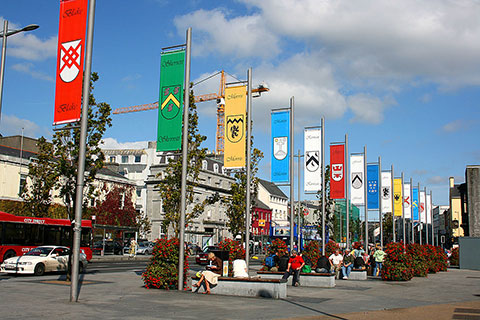
Parallel with Dublin, but on the west coast instead of the east, lies Galway. Combining beautiful beaches with a buzzing city center, Galway offers all the traditional and modern-day Irish experiences you could want: cobbled streets, brightly painted buildings and heaving pubs hosting throbbing live music. The city is known as a hub for arts and culture, and hosts popular annual events such as the Galway Arts Festival and Cúirt International Festival of Literature. Universities in Galway include the National University of Ireland, Galway and Galway Mayo Institute of Technology.
Cork
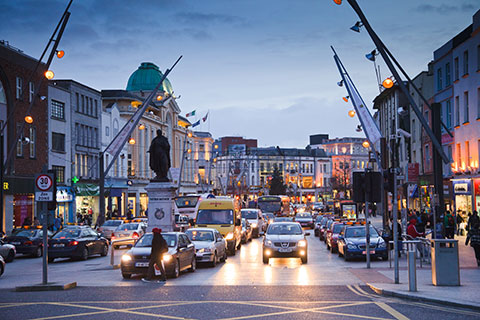
Also well-known for its cultural activity is the city of Cork, located on the south coast of Ireland. Its combination of historic architecture and vibrant cultural life makes it a popular stop for tourists. There’s a good selection of nightlife, from traditional pubs to trendy bars, and as usual in Ireland, stunning countryside is never far away. Universities in Cork include University College Cork and Cork Institute of Technology.
Application, Fees and Visas in Ireland
There are 7 steps to take in order to begin your new life studying in Ireland!
1. Choose you college and programme
Get as much information as possible about the college and the course you’re interested in. once you have narrowed down your choices, contact the college to which you wish to apply and ask them to send you detailed information on the course and on application procedures. (These may vary across different institutions, so if you are interested in more than one college, ask each one for its procedures).
2. Applying for a course
Carefully consider all the information you have been sent. Before you apply ensure that your academic and English language standards meet those required. Again, selection criteria can vary. It is important that provide everything that has been requested.
3. Confirming a place
If you are offered a place, congratulations! Now, you will be asked to send the admission fee. It is important that you do this as soon as possible in order to secure your place.
4. Booking accommodation
Once you have been offered and have accepted your place, think about the practical aspects of living in Ireland. Generally, three types of accommodation are on offer: rented apartments, student accommodation, and home stays. Most universities and colleges have accommodation officers to help you decide which type is best for you. It is really important to organize your accommodation well in advance of your arrival.
5. Passport
Be sure to get your passport as soon as possible. If you already have one, check it is valid for a sufficient amount of time. If it’s due to expire in less than 12 months, apply for a new one.
6. Check the immigration and visa regulations
Apply for your student visa (see below)
7. You’ve arrived!
Welcome to Ireland! When you arrived in Ireland, it is very useful that all your documents are in order and that you have fulfilled all the requirements of your visa approval. If you are staying in Ireland for more than 90 days you will be required to register with the Garda (the Irish police service). Make sure you do this within three months of arrival.
To find out if you need an Irish visa and about applying for a visa, please refer to the website Naturalisation and Immigration Service (INIS), which you’ll find at http://www.inis.gov.ie/en/INIS/pages/study INIS has overall responsibility for all immigration matters and sets the guidelines for supporting documentation to accompany visa applications
- Application Form (www.visas.inis.gov.ie) – signed and dated by applicant
- Parent Confirmation Letter (If under 18 yrs)
- 2 photographs, white background, size 3.5 x 4.5 (zoom 80%)
- Copy of High School result
- Copy of High School certificate
- Copy of Evidence of your level of English (IELTS, TOEFL, etc.)
- Letter of Funding and from whom, e.g. government scholarship, self-funded, etc.
- Copy of Acceptance Letter from University
- Copy of Tuition payment Slip from Bank
- Copy of Receipt Payment from University
- Bank Statement (3-6 months) with authorize stamp from the bank, minimal fund €7,000
- Accommodation Details
- Flight Itinerary
- Medical Insurance
- Copy of Birth or Marriage Certificate
- Copy of current and previous Passports including any visas/ stamps from previous travel history
- 2 sets of all documents (original and copy)
If you submit a document that is not in English, it must be translated by sworn translator.
The Embassy Ireland, Jakarta will NOT keep your original documents, however we need to see all original documents including passport for verification.
Fees and funding
Tuition costs vary depending on the course, the institution and whether you are classified as a European student or non-European students. They also can vary, so check the fees with your chosen institution before you begin an application process.
| Subjects
|
Undergraduate
|
Postgraduate
|
| Medicine & Health Sciences
|
€45.000 – €52.000
|
€4.000- €31.000+
|
| Engineering
|
€9.750 - €23.000
|
€9.250 - €24.000
|
| Science & Technology
|
€9.750 - €22.000
|
€9.250 - €45.000
|
| Arts & Humanities
|
€9.750 - €20.000
|
€9.250 - €22.000
|
| Business
|
€9.750 - €18.000
|
€9.250 - €34.500
|
Cost of living in Ireland
Living expenses vary depending upon where the higher education institution you choose is located, on the type of accommodation you prefer, and on the personal expenditure you choose on average, expect to spend between €7.500 – €12.000 per year (depending on where you are studying and your lifestyle).
English requirements
IELTS – Composite score of 6.0 – 6.5 with not less than 6.0 in any one component
Scholarships
Yes. Over a thousand scholarships are available for International students. These come from a wide variety of Irish sources. For further information go to www.educationinireland.com
Working while studying in Ireland?
Yes, subject to certain conditions. International students holding a valid immigration permission stamp 2 can work up to 40 hours per week only during the months of June, July, August and September, and from 15th December to 15th January inclusive. At all other times students holding immigration permission stamp 2 are limited to working up to 20 hours per week. The permission to work will end when stamp 2 expires.
- If you are a degree programme student, you are eligible for casual work once you are:
- Registered with the Garda National Immigration Bureau (GNIB)
- Enrolled on a recognized programme leading to a qualification recognized by the Minister for Education & Skills
- Attending a full time programme of education at or above NFQ level7
- Undertaking a minimum of 15 hours day time study per week
- Receiving tuition between the hours of 8am and 6pm per week for a minimum of 25 weeks per annum
- On a programme of at least one year’s duration
Ireland at a glance
- Capital city: Dublin
- The Irish name for Ireland is Eire (pronounced AIR-uh).
- Population: 4.6 Million
- Languages: English & Irish
- Government: Republic
- Head of Government: An Taoiseach Enda Kenny
- Head of State: President Michael D Higgins
- Currency: Euro (€)
- Flag: Tricolor of green, white & orange
- Emblem: Harp
- National Day: Saint Patrick’s Day, 17 March
- One land border, with Northern Ireland, which is part of the UK
- Coastal borders with the Irish Sea, Celtic Sea and St George’s Channel – all part of the Atlantic Ocean
- Famous Irish authors include Jonathan Swift, James Joyce, Maeve Binchy and Roddy Doyle.
- Famous Irish playwrights include George Bernard Shaw, Samuel Beckett and Oscar Wilde.
- The most successful country in the Eurovision Song Contest, having won seven times
- Known for producing whiskey and Guinness (a dry stout beer)
- Traditional sports include Gaelic football and hurling
- Major agricultural products include potatoes, barley, turnips, beef and sugar beets.
- A reputation for being rainy, which is justified; depending on the region, it rains between 150 and 225 days a year, according to the Irish Meteorological Service.
Embassy of Ireland in Jakarta contact
For further queries please contact Embassy Ireland in Jakarta: World Trade Centre I, 14th floor – Jalan Jend. Sudirman Kav. 29-31, Jakarta 12920, Indonesia email at jakartaem@dfa.ie or call at +62212809 4300 fax +6221 521 1622.






